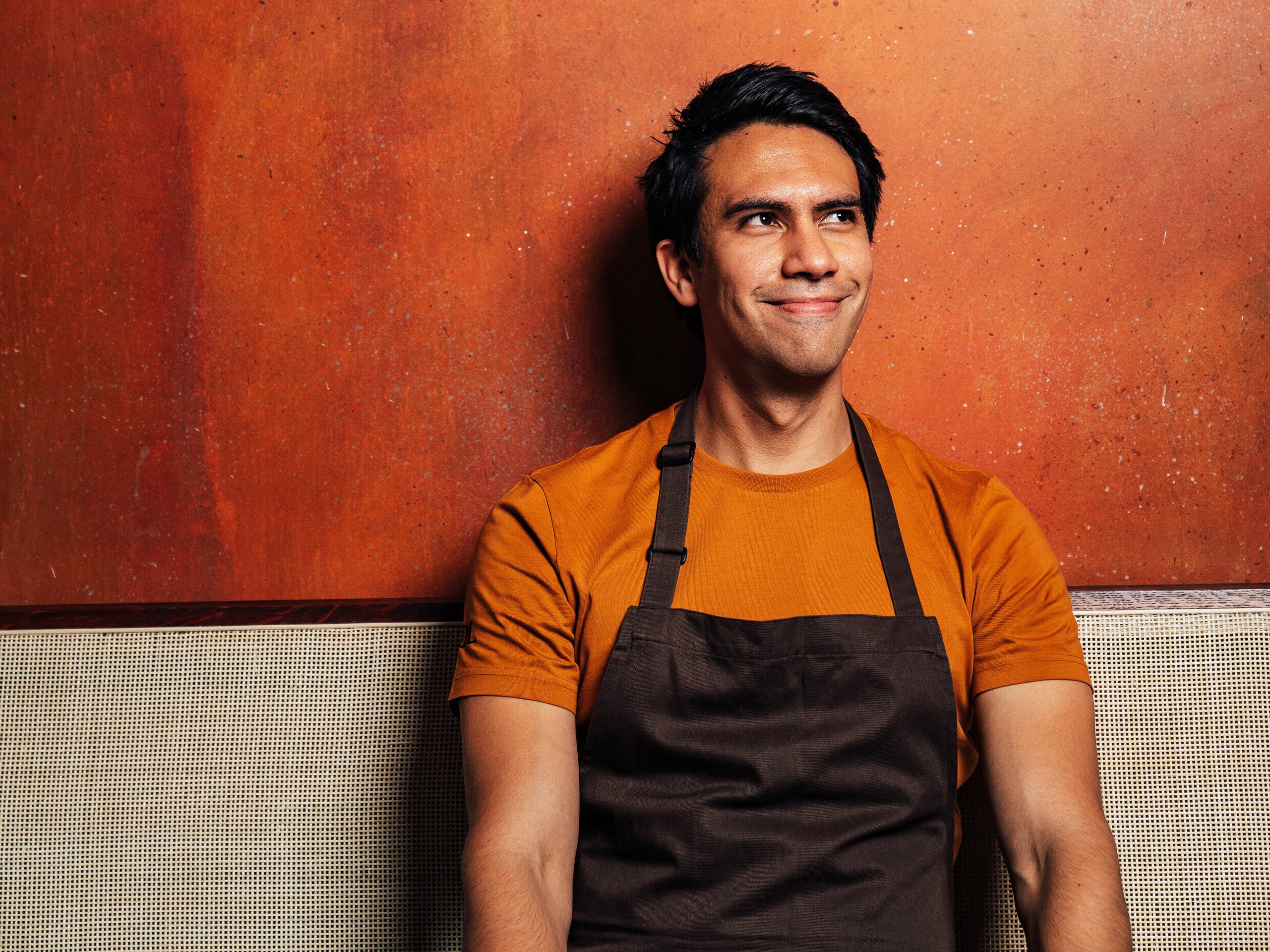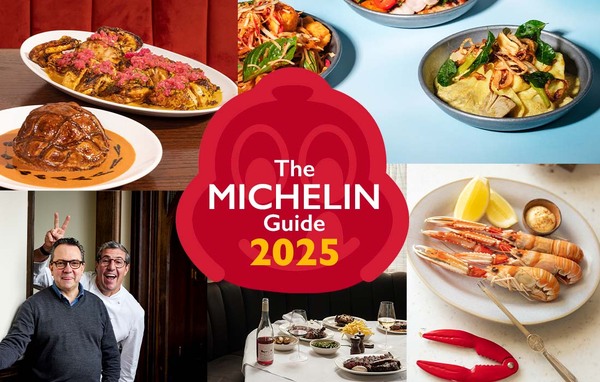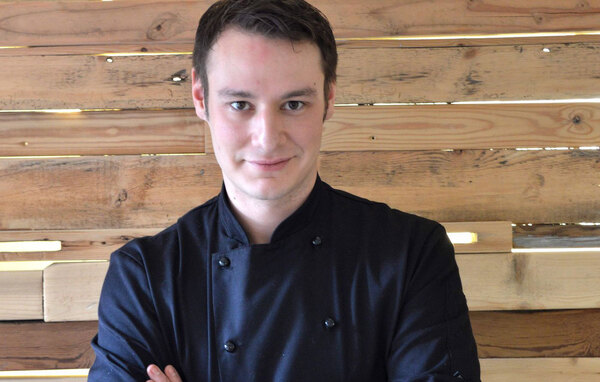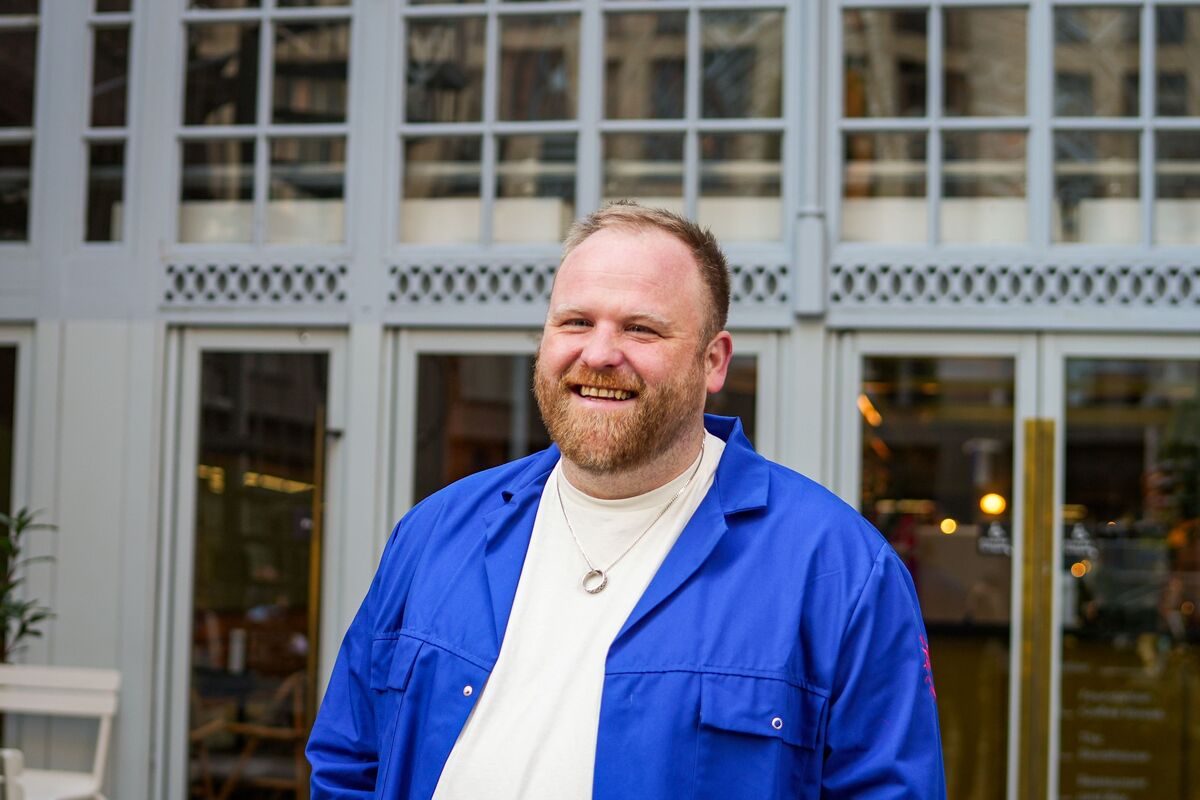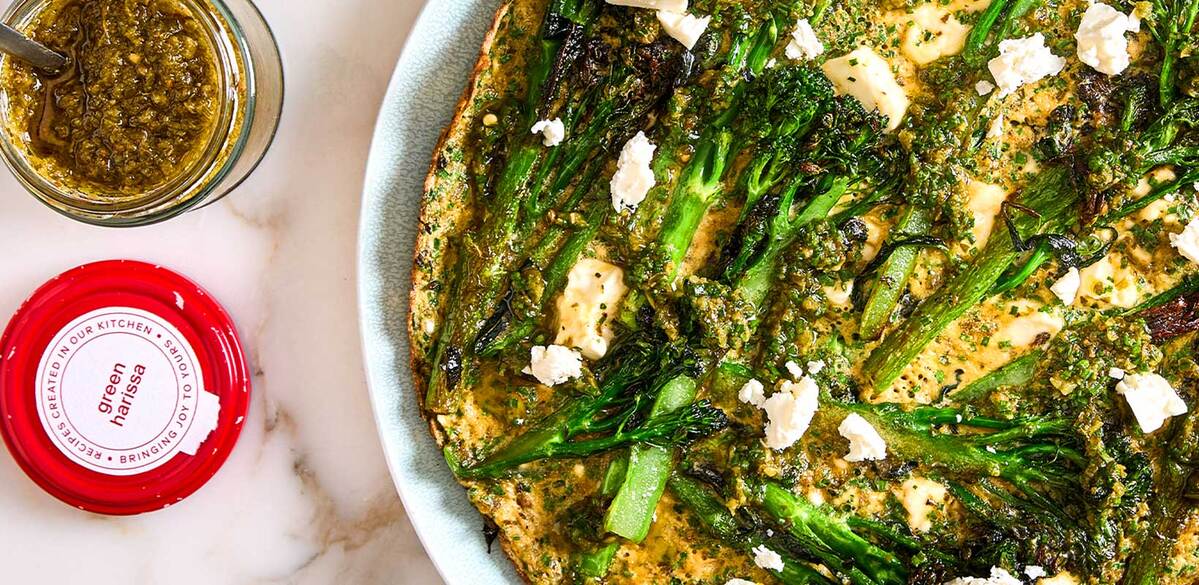Santiago Lastra on opening Kol, the new restaurant bringing Mexican sunshine to Marylebone
Mexican chef Santiago Lastra’s new restaurant Kol has opened in London in what is undoubtedly one of the toughest trading environments the capital’s restaurant scene has witnessed in generations. Lastra explains his vision to Neil Gerrard, of finding an expression for Mexican food using the best British ingredients.
Santiago Lastra knows better than most what a comfort good food and hospitality can be during tough times.
The Mexico-born chef had only just discovered the joy of cooking when, aged 15, his father, grandfather and grandmother all passed away within the space of a month.
Having found inspiration to get into the kitchen by unusual means – a recipe for crab dip on the back of a packet of Ritz crackers that he happened upon in a supermarket – Lastra had by this stage started to work in a local Italian restaurant.
The family bereavement hit him and the rest of his family hard. “I didn’t want to go back to school. I really liked the restaurant, the vibe and the feeling of making something with your hands. I went back and I felt safe. It was something I wanted to do. I brought food home and cooked for my brother and mother, and in that moment, I was happy,” Lastra recalls.

“We were enjoying a meal that I cooked and it was a life-changing moment. If you are so sad, and something that you did can make people feel good in such a difficult time, that is special. It was what I wanted to do for a living.”
If you are so sad, and something that you did can make people feel good in such a difficult time, that is special. It was what I wanted to do for a living
Lastra, now aged 30, has taken that philosophy and applied it to the full, travelling the world in the process. For the past three and a half years, however, he has been in London and, as far as he is concerned, it was the natural choice for his new restaurant opening, Kol, in Marylebone.
“London’s guests are my favourite,” he asserts. “You feel a beautiful vibe of excitement and people like stories and culture. It is a place where even if you are here for just one day, you don’t feel like you are a tourist. You feel like you belong because it is such a multicultural experience.”
Kol was originally supposed to open in April, but coronavirus punctured that particular plan. October, with all the fretting over a second wave, 10pm curfews, tiers, and all the other challenges, may not seem like the obvious time to reschedule the launch. But Lastra is determined to see it through.
Thinking back to the grief he and his family felt when his father and grandparents died, he says: “We are facing something similar now to what I faced back then. Times are difficult and people are sad. You can lift people up through good food. The best thing we can do is to try to make people feel better.”
You can lift people up through good food. The best thing we can do is to try to make people feel better
It’s a simple and noble aspiration that fits with the concept behind Kol, which takes its name from the Spanish word for cabbage. “We wanted to find something humble and turn it into something special. We want to express Mexican culture through British ingredients and the amazing stuff you have here,” he explains.

Kol sits within a 5,000 sq ft new-build unit on the site of a former police station, owned by the Portman Estate. It was the first site Lastra saw, and even though he and business partners Jake Kasumov and Marco Mendes (the duo behind Portuguese piri-piri restaurant Caso do Frango near Borough Market) went on to view up to 40 more, this was the only one for the Mexican chef. “It’s a nice neighbourhood with a lot of great institutional restaurants so we wanted to be part of that,” says Lastra.

Despite the modern setting, Lastra, Kasumov and Mendes want Kol to feel like walking into a big house in Mexico, one where you are welcomed and taken care of. As you enter, you are greeted by a huge frame containing heritage corn husks woven together, made by Mexican artist Fernando Laposse. Warm tones and textures reinforce the homely feel, with a kitchen made up of three islands set in the middle of the dining room. To the back sits a Mexican comal (a cast iron plate to make tortillas) while the fire pit has a chimney that adds to the domesticated air.
The furniture has been custom-made by Milanese designer Alessio Nardi’s A-nrd studio, while vintage clay pots, some of which are 150-200 years old, have been rescued from Mexican backyards to adorn the walls in the rear of the restaurant.

Downstairs is a private dining room in muted concrete tones that can accommodate 22 people, with its own test kitchen and chef’s table. During the pandemic, it has been set up as three tables of four that can be booked on Friday and Saturday evenings and Sunday lunchtime. A mezcaleria serving Mexico’s famous agave-based spirit, headed up by former head bartender of the Savoy’s American Bar Maxim Schulte, is due to open soon.
The menu
Kol’s menu will offer a five- and six-course option for £55 and £70 respectively, with no à la carte in order to avoid waste. “This allows us to be more organised. We can minimise the hours and make our staff [of which there are 32 in total, including 12 chefs] work more efficiently, and we can also curate the best experience for the guest,” says Lastra. “And we don’t want this to be a restaurant where you spend too much money so that it ends up being a once-in-a-lifetime experience. The two prices make it a more accessible meal.”

Both menus start with a seaweed and chilli broth, and while the chilli may be imported from Mexico, the seaweed travels only a short distance from the coasts of Cornwall and Kent. “We want to represent the seasons of the UK but add some Mexican hints. We make a broth of toasted seaweed but then we add Mexican chillies and mezcal. The idea is that we welcome people with something warm that represents the two countries,” Lastra says.
We want to represent the seasons of the UK but add some Mexican hints to it
He is also looking forward to serving the ‘Coloradito’ braised short ribs with a mole made from Kentish quinces, served with roasted carrots. “We slow-cook the ribs for 20 hours with some chillies from Oaxaca that are smoked over peppercorn wood, and then we make a glaze with brown sugar and quince juice. We serve it with some fresh corn tortillas,” he explains.
Scottish langoustines dressed with smoked chilli cream feature in a taco served with sauerkraut and a reduction of Scottish sea buckthorn juice. The intensely sour sea buckthorn berries take the place of Mexican limes, in another nod to British produce.

The creations have already piqued the interest of London diners, with several hundred bookings made within the first few minutes of reservations opening “We will treat people who come here really well and we cannot wait for them to come and try it,” he says.
He admits that the timing may not be ideal but asserts: “We have just got to do it. We have been working on this for three years. We have the site and I don’t want to lose my team –they are amazing. If you want to wait until the world is perfect, you are never going to do anything. We just need to do it and be positive.”
Noma and the nomadic chef
After graduating from high school in Mexico, where he worked in an Italian restaurant from the age of 15, Lastra headed for Spain, where he worked at Michelin-starred Europa in Pamplona.

At the age of 19, he returned home to attend the Coronado Institute culinary school in Mexico City, before heading off to Spain once more to the world-renowned, two-Michelin-starred Mugaritz near San Sebastián.
When he was 24, he bought a one-way ticket to Copenhagen, arriving with just €50 in his pocket. He sent out emails to 100 restaurants asking for a job and slept on the floor in an empty flat. “You have to see it as an adventure. I didn’t speak English well and I had no clue what people were saying in service. I would go home super-tired. But then the next day, I woke up, go in with a smile, learn the language and work hard,” he says.
Among the places Lastra worked while in Denmark was Noma offshoot Nordic Food Lab, where he worked on a culinary research project entitled ‘The secret of the tortilla’. He had already moved to Russia when he took a call from former Noma pastry chef Rosio Sanchez, who spotted one of his dishes on Instagram and wondered if he was interested in talking to Noma head chef René Redzepi about a job.

That job turned out to be project manager of Noma Mexico in Tulum, which opened in 2017. “Working at Noma with René was really important for me in terms of understanding culture,” says Lastra. “He was a mentor and we travelled round Mexico together, discovering. He gave me the chance to understand my culture and what quality means.”
Over the following two years, Lastra cooked in kitchens around the world, taking in 27 countries, including France, Italy and Taiwan, as well as returning to Mexico to study indigenous cooking. “We use different ingredients at Kol but we don’t change the essence of Mexican cooking,” he says. “It needs to be respectful.”
The evolution of Mexican food in the UK
When Santiago Lastra’s compatriot Edson Diaz-Fuentes, co-founder of Santo Remedio, arrived in the UK 13 years ago, Wahaca in Covent Garden had just opened. “I was happy to see tacos and tostadas and, in fact, I went on to work with Tommy [Thomasina Miers] and Mark [Selby] in 2014. But after a few months of being here I realised how sad the Mexican food scene was. It was Wahaca and not much else.”
Producing “authentic” Mexican food outside of the country was and, to a certain extent, remains, a tough task. That’s in part due to the lack of Mexican produce, which is now less scarce than it was, but also because the authenticity of Mexican cooking “cannot be translated” to a blender or food processor, according to Diaz-Fuentes.
“Traditional Mexican cooking implies molcajetes [pestle and mortar], metates [a traditional rectangular-shaped stone used to grind corn to make tortillas] and other utensils,” he says.
Suppliers 13 years ago weren’t terribly interested in Mexican ingredients, Diaz-Fuentes says, and knowledge of his home country’s cuisine in the UK generally only stretched as far as burritos and Tex-Mex.
But when he returned to the UK in 2014, after leaving in 2010, there had been an “explosion” of Mexican offerings. Among those flying the flag that spring to mind for Diaz-Fuentes are La Bodega Negra in Soho, Martha Ortiz’s Ella Canta within the InterContinental London Park Lane, former Pitt Cue chef Oscar Holgado, who is now head chef at Coombeshead Farm hotel in Cornwall, El Pastor in Borough Market and Casa Pastor at Coal Drops Yard, as well as the now-closed Casa Morita in Brixton market and Peyotito in Notting Hill under head chef Adriana Cavita.
By 2014, Diaz-Fuentes too was inspired to bring some of the flavours he missed to London where, post-Olympics, he was finding that Mexican food was being very well-received.
For his part, it was competing in Jonathan Downey’s ‘Taco Wars’ that helped inspire Diaz-Fuentes to start Santo Remedio. “My taco was extremely well received at Taco Wars. A lot of people were asking, ‘What is this flavour?’ I used hoja santa, which hadn’t been tried much in the UK. It’s a super-fresh herb from Oaxaca with an aniseed flavour, and I combined it with grilled octopus that was marinaded in Pasilla mixed chillies, with black beans, avocado leaves, Serrano mayo and pickled radishes.
“That inspired me to open something small in Shoreditch where we could recreate that and dishes like pork cheeks with salsa verde. It has been a challenge, but it has been great to see critics appreciate it and realising that Mexican food isn’t just covered in cheese but can be fresh, citrussy and delicious.”
And the popularity of Mexican cuisine isn’t just limited to London. Diaz-Fuentes credits Wahaca and Rick Stein, who presented the popular BBC series Road To Mexico, with extending its appeal to the rest of the country. And now other programmes, such as Netflix’s Taco Chronicles and Chef’s Table are teaching people about Mexican food.
“More people are incorporating ancho chillies into their food,” says Diaz-Fuentes. “They are adding chipotle to dishes and I am seeing salsa verde. If it is authentic is questionable, but there is more of an influence. If they are incorporating tomatillos or habanero or trying to recreate kinds of moles, that is good to see.”
Diaz-Fuentes has used lockdown to work on a Mexican cookbook, which has inspired him to look at how the food of Mexico City has changed in the 18 years since he lived there, as well as exploring a project to make and deliver Mexican tortas.
“When we are past the pandemic, hopefully we will emerge stronger and can offer people more options for lunch and dinner and also learn to cook more at home. I can see more Mexican items on the shelves and that is encouraging. It is great to see more understanding and interest from people.”
Photography by Haydon Perrior/Charlie Mckay HDG Photography



